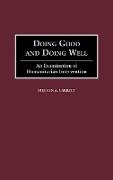Doing Good and Doing Well
BücherAngebote / Angebote:
Garret deals with the issue of humanitarian intervention, of which the recent Kosovo conflict provides a prime example. Even though the writing of this book was completed before NATO began its intervention on behalf of the Kosovars, the book provides a valuable background for assessing the Kosovo issue-it lays out the history of previous humanitarian interventions and analyzes the controversies surrounding them. Garret provides a sophisticated framework by which such interventions can be evaluated both morally and pragmatically. His book offers some particularly relevant material on the American role in humanitarian interventions. This book is valuable for those who wish to make sense of the pros and cons of humanitarian efforts in international hot spots, like Kosovo.After an analysis of the legal and philosophical issues bearing on the idea of humanitarian intervention, defined as the use of force by one or more states to remedy severe human rights abuses in a particular country-this study focuses upon the moral duties that individual members of the international community have toward the welfare of others. Recent events have indicated that humanitarian intervention will likely play a larger role in international relations in the future. Examples in the contemporary period include Kosovo Somalia, Liberia, Haiti, the Kurds in Iraq, Uganda, and East Pakistan. This book emphasizes the role of the United States in humanitarian intervention and argues that increased American involvement is essential.Garrett suggests that the American people as a whole may be more prepared to see the United States take an active role in humanitarian intervention than are certain media and government elites. Strong national leadership that stresses the moral duty of the United States will be necessary to tap this latent altruism in order to contribute to higher standards of international human rights. Individual topics include assessment criteria for the moral legitimacy of intervention, unilateral versus multilateral efforts, and factors that appear to persuade or dissuade states from participating in such intervention. This volume focuses on certain themes and patterns in humanitarian intervention, which are then illustrated by using historical data taken from a variety of different examples.
Folgt in ca. 15 Arbeitstagen
